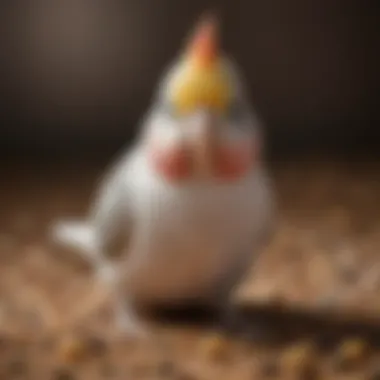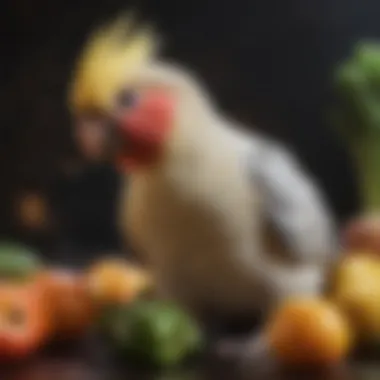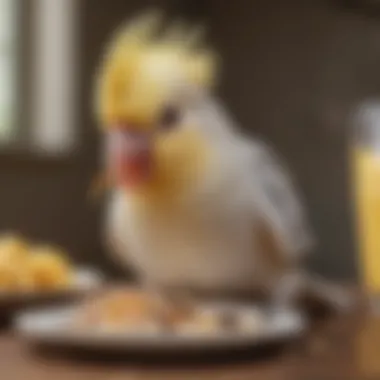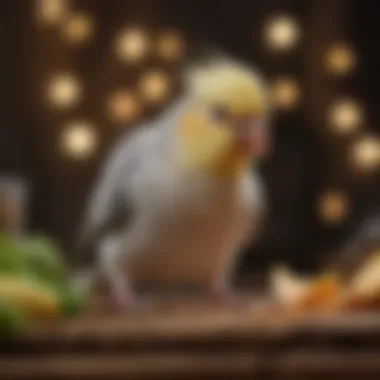Selecting the Best Cockatiel Food: A Comprehensive Guide


Intro
Selecting the appropriate food for cockatiels is a crucial aspect of their care. With the right diet, these birds can lead healthier, more vibrant lives. This guide explores the nutritional requirements specific to cockatiels, discusses various food options available, and provides insights into feeding strategies that align with their species-specific needs. It also addresses common dietary pitfalls that pet owners often encounter. By understanding these elements, you will be better equipped to ensure optimal nutrition for your feathered friends, ultimately fostering their well-being and happiness.
Understanding Your Pet
Before delving into the specifics of cockatiel nutrition, it is essential to comprehend the overall needs of these intriguing birds. Cockatiels, known for their sociable nature and charming personalities, require a balanced diet to thrive.
Pet Behavior Basics
Cockatiels are naturally curious and active. They often express their feelings through vocalizations and body language. Understanding your pet's behavior can help you tailor their diet to meet their physical and emotional needs. A happy cockatiel will often exhibit a variety of behaviors like singing, preening, and engaging with its surroundings.
Common Breed Characteristics
Cockatiels are small to medium-sized birds, usually characterized by their distinctive crests and a wide range of color variations. Each cockatiel has its unique personality, which may influence its dietary preferences. Some may prefer seeds, while others might enjoy fresh fruits and vegetables. Becoming familiar with these characteristics can assist you in making informed food choices that cater to their tastes.
Species-Specific Needs
A cockatiel’s dietary requirements differ from other birds. They thrive on a combination of seeds, pellets, and fresh foods. Essential nutrients include proteins, vitamins, and minerals. Particularly, calcium is vital for their bone health and reproductive abilities. It can be effectively sourced from dark leafy greens and specialized supplements. Knowing these specifics helps ensure your cockatiel receives balanced nutrition and can reduce the risks of health problems.
A well-balanced diet helps prevent health issues like obesity, feather plucking, and beak deformities in cockatiels.
Understanding Cockatiel Dietary Needs
Understanding the dietary needs of cockatiels is critical for their overall health and well-being. These birds require a balanced diet that provides essential nutrients to thrive. Proper nutrition helps maintain their physical and mental health, promotes vibrant plumage, and supports longevity. Ignoring these needs can lead to various health issues.
Essential Nutrients for Cockatiels
Cockatiels benefit from several key nutrients. Recognizing the importance of these nutrients is vital in selecting the right food options.
Proteins
Proteins are fundamental for growth and overall health in cockatiels. They support muscle development and feather growth. A diet rich in protein helps maintain a strong immune system. High-quality proteins, such as those found in pellets and certain seeds, are particularly beneficial.
A characteristic feature of protein is its role in bodily repair and regeneration. For cockatiels, it is essential for maintaining energy levels throughout the day. Selecting foods with adequate protein content is a sound choice in ensuring the overall health of your cockatiel.
Vitamins
Vitamins play a crucial role in various biological functions, particularly in energy production and immune response. Cockatiels require specific vitamins, such as A, D3, and E, to support healthy vision, strong bones, and antioxidant functions.
The unique feature of vitamins is their limited storage in the body, which means regular consumption through diet is necessary. Ensuring that your cockatiel has access to a variety of foods that are rich in vitamins is benefecial for preventing deficiencies.
Minerals
Minerals are essential for many physiological processes, including bone health, nerve function, and enzyme activity. Calcium and phosphorus, in particular, are critical minerals that help support bone structure in cockatiels.
Minerals are unique because they cannot be synthesized in the body, which highlights the importance of dietary sources. Products such as mineral blocks or fortified pellets can assist in meeting their mineral needs and should be part of the food selection process.
Common Dietary Deficiencies
Understanding common dietary deficiencies provides insights into the importance of a well-rounded diet for cockatiels. Recognizing the symptoms of deficiencies can help prevent long-term health issues.
Symptoms and Signs
Symptoms of dietary deficiencies can manifest in various ways. Signs may include feather plucking, lethargy, or changes in eating behavior. Noticing these signs early can be crucial for prompt intervention. It helps ensure that your cockatiel receives the right nutrients needed for good health.
The key characteristic of recognizing these symptoms is developing the ability to understand your pet's unique needs. If deficiencies are not addressed, healthier birds can be at risk for more severe health problems.
Long-Term Effects
Long-term effects of dietary deficiencies can be devastating for cockatiels. Continuous lack of essential nutrients can lead to chronic health conditions. This may result in reduced lifespan and quality of life.


A key insight in this section is the necessity of establishing a proper feeding routine that meets the nutritional requirements. The repercussions of neglecting these dietary needs are significant, affecting not just the individual bird but also impacting the caregiver's experience with the pet.
Proper dietary habits in cockatiels are fundamental for their long-term health and happiness.
Types of Cockatiel Food
Choosing the appropriate food for cockatiels is crucial for their health and overall wellness. This section highlights various types of food available to ensure a balanced diet for these birds. Understanding the different options helps pet owners make informed choices that will enhance the well-being of their feathered friends. Each type of food has its unique benefits and drawbacks. The right selection can influence not only the nutritional intake but also the behavior and health of cockatiels, making it an important aspect of pet care.
Pellets: The Nutritional Staple
Pellets are considered a fundamental part of a cockatiel's diet. They contain a balanced mix of essential nutrients that support overall health. The consistent formulation in pellets makes them a reliable food source.
Brands to Consider
When selecting pellets, certain brands stand out for their quality. Brands like Kaytee, Zupreem, and Harrisons offer well-rounded formulations. Kaytee is known for its natural ingredients, while Zupreem focuses on species-specific diets. Harrison's, on the other hand, emphasizes organic and non-GMO components. Choosing these brands can ensure that cockatiels receive the necessary nutrients in a digestible form. However, pet owners should always read reviews and check for recalls to ensure they are making the best choice.
Pros and Cons
The advantages of pellets include their balanced nutrient content and convenience. They are easy to store and serve, reducing preparation time. However, some birds may show preference for seeds, which can lead to reluctance in eating pellets. Also, not all pellets are created equal. Some may contain fillers and artificial colors, which can be detrimental to a cockatiel's health. Therefore, scrutinizing the ingredients list can help pet owners avoid these issues.
Seeds: A Traditional Choice
Seeds have traditionally been a staple in many birds' diets. For cockatiels, this option remains popular. Seeds come in various mixes and can be a fun way for birds to forage.
Seed Mixes
Seed mixes can provide variety in a cockatiel’s diet. They often include sunflower seeds, millet, and safflower, which can be appealing to birds. Using seed mixes can add excitement to feeding time. However, relying solely on seed mixes can lead to imbalanced nutrition, as they lack essential vitamins and minerals. Therefore, supplementing them with other food types is advisable for optimal health.
Risks of Seed-Only Diets
Choosing a seed-only diet poses several risks. Without necessary nutrients, cockatiels may develop deficiencies that can affect their health. Common symptoms of malnutrition include lethargy, feather plucking, and weight loss. Long-term effects can be severe, leading to problems such as liver disease or reproductive issues. Thus, it is crucial to diversify their diet beyond seeds to uphold their health.
Fresh Fruits and Vegetables
Incorporating fresh fruits and vegetables into a cockatiel’s diet is very beneficial. These foods provide crucial vitamins and minerals that pellets and seeds may not always offer.
Beneficial Options
Fruits like apples, bananas, and berries, along with vegetables such as carrots, spinach, and broccoli, can be excellent for cockatiels. These fresh foods enhance hydration and provide essential nutrients. It's important to ensure that fruits and vegetables are washed thoroughly and offered in manageable sizes. However, moderation is key, as some fruits can be high in sugar.
Feeding Guidelines
To safely introduce fresh produce, owners should start with small amounts. Cockatiels may need time to adjust to new foods. Aim to offer fresh items a few times a week, ensuring a balance with their core diet. Though fresh foods can enrich a bir's diet, they should always be given in conjunction with pellets or seeds to ensure full nutritional coverage.
Homemade Cockatiel Food
Making homemade food can be a rewarding experience for both the pet owner and the cockatiel. It allows for customization according to individual dietary needs.
Recipes to Try
Pet owners can experiment with various recipes. For example, a simple mixture of cooked grains, veggies, and some seeds can make a nutritious meal. Another idea is to blend vegetables with a small amount of pellets or seeds to help birds transition to new flavors. Nevertheless, people should research and follow guidelines to ensure that all ingredients are safe and beneficial for cockatiels.
Considerations
While homemade food can enhance diet, it requires careful planning. Owners must ensure that recipes are nutritionally balanced. Additionally, it's important to avoid toxic foods such as avocado or chocolate, which can harm cockatiels. Monitor the bird's reaction to homemade meals and adjust accordingly to maintain interest and health.
Evaluating Commercial Cockatiel Foods
Evaluating commercial cockatiel foods is a critical aspect of ensuring that your pet bird receives optimal nutrition. With numerous options available on the market, pet owners must carefully consider the ingredients and nutritional profiles of these products. Making informed choices can lead to better health outcomes and overall well-being for cockatiels. Evaluating these foods involves understanding labels, knowing what nutrients are essential, and selecting trusted brands.
Reading Labels: What to Look For


Ingredient Lists
Ingredient lists serve as the foundation for evaluating commercial cockatiel food. When examining these lists, first focus on the quality and order of ingredients. Ingredients are typically listed in descending order by weight. A high-quality food should have whole grains, seeds, and vegetables as primary components. Avoid products with unspecified meat by-products or fillers. These often do not provide the necessary nutrients and could lead to dietary imbalances.
The key characteristic of ingredient lists is that they reflect the actual contents of the food. They can reveal the presence of artificial additives, preservatives, or colors. By prioritizing feeds containing natural and wholesome ingredients, owners can make better choices for their feathered companions.
Nutritional Content
Nutritional content highlights the specific vitamins, minerals, and macronutrients present in commercial food. Ensure the product meets the essential dietary needs of cockatiels, which include proteins, fats, and carbohydrates. A good product should also be fortified with vitamins like A, D3, and E, which support overall health.
The key characteristic here is how well the food complements the natural diet of cockatiels. A more comprehensive nutritional profile allows for balanced sustenance. A focus on nutritional content encourages pet owners to avoid foods that skimp on essential nutrients, leading to deficiencies that could affect their birds' health.
Top Recommended Brands
Brand A
Brand A is notable for its commitment to quality ingredients. It offers a balanced formula that meets the nutritional needs of cockatiels. One distinguishing feature of Brand A is its use of organic seeds and grains. This can contribute to a healthier diet free from harmful pesticides and additives. However, the availability of this brand may vary by location, making it less accessible for some owners.
Brand B
Brand B has gained popularity due to its tailored formulations designed for specific dietary needs, including weight management options. This brand highlights its protein content, which is crucial for maintaining healthy muscle and tissue growth. The unique feature of Brand B lies in its variety of flavors that caters to picky eaters. However, the price point may be higher compared to other options, making it less budget-friendly for some customers.
Brand
Brand C focuses on providing a comprehensive mix of seeds and pellets. This blend is advantageous as it incorporates a variety of textures and flavors, appealing to cockatiels' instincts. Furthermore, Brand C emphasizes transparency in its sourcing and production processes. Despite its merits, not all cockatiels may adapt easily to the change from their typical diet to Brand C. Some birds might take time to adjust to this mixed approach.
Choosing the right commercial food can significantly influence your cockatiel's health. Owners should examine labels carefully and select brands that prioritize quality ingredients and nutritional value.
Feeding Practices for Cockatiels
Feeding practices are crucial in maintaining the health and well-being of cockatiels. Understanding how to properly feed these birds can significantly enhance their quality of life. Proper feeding involves not just the type of food provided but also how much and how often it is given. An attentive approach to feeding can help prevent health issues and promote a lively, active pet.
Portion Control
Daily Recommendations
Daily recommendations for feeding cockatiels serve as a fundamental guideline to ensure a balanced diet. It is generally suggested that an adult cockatiel should receive about 1/4 to 1/2 cup of pellets or seeds per day. This quantity aligns with most nutritional needs for average-sized cockatiels. Carefully monitoring their intake can prevent overfeeding, which is a common issue among pet owners. The main reason daily recommendations hold significance is that they help maintain an ideal weight. A proper weight leads to fewer health complications.
Several factors, such as age and activity level, influence the precise amount. Therefore, these daily recommendations are flexible to accommodate individual differences. That variability can be a strength as it allows for tailored diets, contributing to overall health.
Adjusting for Individual Needs
Adjusting for individual needs is a personalized approach to feeding. It recognizes that every cockatiel has unique dietary requirements based on factors like age, weight, health status, and activity level. Some cockatiels may need more energy if they are particularly active, while others may require less due to health concerns.
An important characteristic of this practice is the observant nature it encourages from the owner. By paying close attention to a cockatiel’s habits and health, owners can make adjustments as necessary. This proactive feeding tactic is beneficial as it minimizes the risk of obesity or malnutrition. Nonetheless, constant adjustment can be complicated. Pet owners should regularly consult with a veterinarian to ensure appropriate changes are made without prejudice to the bird’s well-being.
Feeding Frequency
Morning vs.
Evening Feedings
Feeding frequency can affect a cockatiel's energy levels and behavior throughout the day. Some owners prefer to feed their cockatiels in the morning to establish a routine. This method can be beneficial as it aligns with the natural waking period of birds. Fresh food in the morning can provide a burst of energy for daily activities. In contrast, evening feedings can lead to leftover food being consumed overnight, which may not be ideal for freshness and palatability.
The key characteristic here is consistency. Whichever method is chosen, maintaining a consistent feeding schedule helps create stability in a cockatiel's daily routine. However, a potential downside to morning feedings is the chance of uneaten food for the rest of the day. This can lead to spoilage.
Impact on Behavior
The feeding schedule has a profound impact on behavior. Cockatiels, like many birds, can exhibit changes in mood and energy based on when they eat. A well-timed feeding can enhance their sociability and reduce any potential anxiety. Morning feedings can set a tone of activity, while late feedings may lead to a slowdown as they prepare for rest.
It's important to recognize how these feeding practices can influence behavior in daily interactions. Some cockatiels might become nippy or less approachable if they feel hungry at inappropriate times. Owners should be mindful of these effects. An activity log may help track behavior changes in relation to feeding to find the most enjoyable routine for both bird and owner.


Understanding and optimizing feeding practices can enhance the quality of life for cockatiels, allowing them to thrive in a home environment.
Common Mistakes in Cockatiel Feeding
Feeding cockatiels involves more than just filling a bowl with food. Many pet owners unintentionally perpetuate common mistakes that can impact their birds' health. Recognizing these mistakes is crucial for ensuring the well-being of your feathered companion. Understanding what to avoid not only promotes better health but also enhances the overall quality of life for cockatiels. Here are key errors to watch out for when feeding these birds.
Overfeeding and Its Consequences
Health Risks
One common hazard with cockatiels is overfeeding. Pet owners might not realize how much food is too much. Excessive calories can lead to obesity, which in turn can cause heart disease and liver problems. This aspect is significant because maintaining a healthy weight is essential for preventing long-term complications. Pet owners must be mindful of their bird's portion sizes. A well-balanced diet is key for ensuring good health and longevity. Reducing calorie intake can positively influence the overall diet.
Behavioral Changes
Chronic overfeeding can also lead to notable behavioral changes. Cockatiels that are overfed may become lethargic, less active and more prone to boredom. This change in behavior can significantly affect their quality of life. An increase in weight can also impede natural behaviors such as flying and climbing. Encouraging active playtime is vital for mental stimulation and physical health, making it essential to avoid overfeeding.
Neglecting Variety
Importance of Diverse Diet
Another mistake is neglecting the importance of a diverse diet. Birds, like cockatiels, thrive on a variety of nutrients that come from different foods. Offering only one type of food, such as seeds, can lead to nutritional deficiencies. A varied diet, including pellets, fresh fruits, and vegetables, provides the essential nutrients necessary for optimal health. This diversification is not just beneficial; it ensures that birds receive a broad spectrum of vitamins and minerals crucial for their development.
Introducing New Foods
Finally, introducing new foods is often overlooked by pet owners. It is important to gradually add new items to a cockatiel's diet. Sudden changes can cause digestive issues or refusal to eat. However, regularly incorporating different foods can help keep your cockatiel interested and excited about meals. Trying out meals can be a fun way to discover what your bird prefers. Proper introduction methods can lead to a well-rounded and healthy diet.
Introducing variety not only supports nutrition, but also keeps mealtimes engaging for your cockatiel.
Ensuring the right feeding practices can be a balancing act. It takes careful observation and adjustments to keep your cockatiel healthy and happy.
Monitoring Cockatiel Health Through Diet
Monitoring the diet of your cockatiel is vital for ensuring their overall health and well-being. A proper diet not only impacts the physical condition but also plays a significant role in behavioral aspects. Understanding how diet affects your cockatiel can help in making informed choices about their food. Key benefits include identifying signs of nutritional sufficiency and recognizing when dietary adjustments are needed. By closely observing their health, you can take proactive steps to support their long-term wellness.
Signs of a Healthy Diet
Weight Maintenance
Weight maintenance is a critical indicator of a cockatiel's health. A healthy weight signifies that your bird is receiving the right balance of nutrients. Cockatiels can become overweight, leading to serious health issues such as heart disease. Therefore, observing your cockatiel’s weight regularly is advantageous for any pet owner.
- Key Characteristic: Consistency in weight indicates proper feeding practices. If your cockatiel maintains its weight without extreme fluctuations, it suggests a balanced diet.
- Unique Feature: Monitoring weight allows for early detection of potential dietary issues. This can prevent health further complications down the line.
Maintaining a healthy weight is a beneficial choice for this article. It emphasizes the care involved in managing a cockatiel's diet effectively.
Vibrant Plumage
Vibrant plumage is another clear sign of a well-nourished cockatiel. The feathers should appear bright and full; any dullness can indicate nutritional deficiencies. Feather health affects not only appearance but overall comfort and self-esteem in cockatiels.
- Key Characteristic: Healthy plumage reflects good dietary practices. Proper intake of vitamins and minerals helps promote shiny and attractive feathers.
- Unique Feature: Monitoring plumage conditions can provide insights into specific dietary needs. Changes in feather quality may alert you to the need for dietary adjustments.
A bird with vibrant plumage appears more appealing and is likely happier. This aspect further highlights the importance of observing physical markers that indicate health.
Identifying Dietary Issues
Identifying issues related to diet is crucial for a cockatiel's well-being. Awareness of potential problems helps owners correct any dietary deficiencies before they escalate. When observing your bird, consider both behavioral indicators and physical symptoms, as these can provide useful clues.
Behavioral Indicators
Behavioral indicators can often reveal if your cockatiel isn’t receiving the proper nutrition. Changes in behavior, such as increased aggression or lethargy, may point to dietary issues. This aspect is essential for pet owners to recognize as it directly correlates with the bird's overall happiness.
- Key Characteristic: Noticeable alterations in typical behavior can signal distress. These changes might indicate that your cockatiel is not thriving or comfortable with its diet.
- Unique Feature: Tracking behavioral changes is beneficial, as it aids in pinpointing dietary problems over time. Attention to behavioral indicators positions owners to intervene early.
Physical Symptoms
Physical symptoms such as feather loss, changes in droppings, or a dull appearance are important signs of potential dietary issues. Recognizing these symptoms allows for timely interventions that can support healthy dietary habits.
- Key Characteristic: Physical symptoms provide tangible evidence of issues. Monitoring your cockatiel for these signs is crucial to dietary management.
- Unique Feature: Early observation can lead to fast recovery if adjustments are made. This means that understanding physical indicators can ultimately guide better feeding practices.
Recognizing physical symptoms of dietary issues ensures that your cockatiel receives the nutritional support it needs for optimal health.







